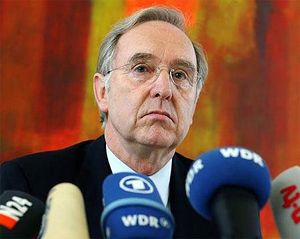Difference between revisions of "Ulf Böge"
(Created page with "{{person |wikipedia=https://de.wikipedia.org/wiki/Ulf_B%C3%B6ge |alma_mater=University of Mainz |imdb=https://www.imdb.com/name/nm2569011/ |birth_date=anuary 22, 1942 |image=...") |
|||
| Line 3: | Line 3: | ||
|alma_mater=University of Mainz | |alma_mater=University of Mainz | ||
|imdb=https://www.imdb.com/name/nm2569011/ | |imdb=https://www.imdb.com/name/nm2569011/ | ||
| − | |birth_date= | + | |birth_date=January 22, 1942 |
|image=Ulf Böge.jpg | |image=Ulf Böge.jpg | ||
| − | |birth_place=Eberswalde | + | |description=Economist who headed the German anti-trust office for 8 years |
| + | |birth_place=Eberswalde, Germany | ||
|employment={{job | |employment={{job | ||
|title=Bundeskartellamt/President | |title=Bundeskartellamt/President | ||
Revision as of 04:06, 14 May 2019
 | |
| Born | January 22, 1942 Eberswalde, Germany |
| Alma mater | University of Mainz |
Dr. Ulf Böge is a German economist. He was President of the Bundeskartellamt from 1999 to 2007.
Background
Ulf Böge went to Mainz in 1964 to study economics and later to Bonn. After graduating in 1968, he became a research assistant at the Department of Economics and Public Finance at the University of Mainz with a focus on economics, competition theory and finance. He gained a PhD in 1971.
Career
After receiving his doctorate, Böge joined the German Ministry of Economics,. In 1976, Böge joined the Federal President's Office under Federal President Walter Scheel as Head of Division for the Department of Economics. After leaving office as president, Böge became head of his office in 1979. Until the mid-1990s, followed by a number of stations in economic policy areas, before he became head of the Department of Energy Policy in 1997 and 1998 of the Department of Economic Policy in the Ministry of Economics. Böge was instrumental in the adoption of the European Energy Charter (1993), a treaty of international law especially between the EU and EFTA countries and Russia and the successor states of the USSR and within the EU on the liberalization of European electricity and gas markets.
In 2000, Böge took over the cartel office of Dieter Wolf, which had just moved from Berlin to Bonn to take up office, and whose president, Böge, was appointed as the first non-jurist in January 2000. In 2000, he became Deputy Chairman of the Competition Committee (CC) at the OECD, Paris and, from 2004, Chairman of the Steering Group of the International Competition Network (ICN), together with Mario Monti, Commissioner responsible for Competition in the European Commission initiated by American colleagues. His successor at the head of the Federal Cartel Office was the President of the Federal Office of Economics and Export Control (Dr. Bernhard Heitzer, on.
Federal Cartel Office
Böge introduced the so-called bonus scheme in March 2000 to better combat antitrust collusion and, one year later, its own cartel prosecution unit. He levied penalties against large banks and the largest industrial insurers after the announcement of tariff agreements. He also fined German cement producers and brought an injunctions against a dominant energy supplier. He resisted the consolidation of corporate media planned by Wolfgang Clement at the end of 2005, blocking Bild's move into television.[1]
Events Witnessed
| Event | Location(s) | Description |
|---|---|---|
| Bilderberg/1980 | Germany Aachen | The 28th Bilderberg, held in West Germany, unusually exposed by the Daily Mirror |
| Bilderberg/1983 | Canada Quebec Château Montebello | The 31st Bilderberg, held in Canada |